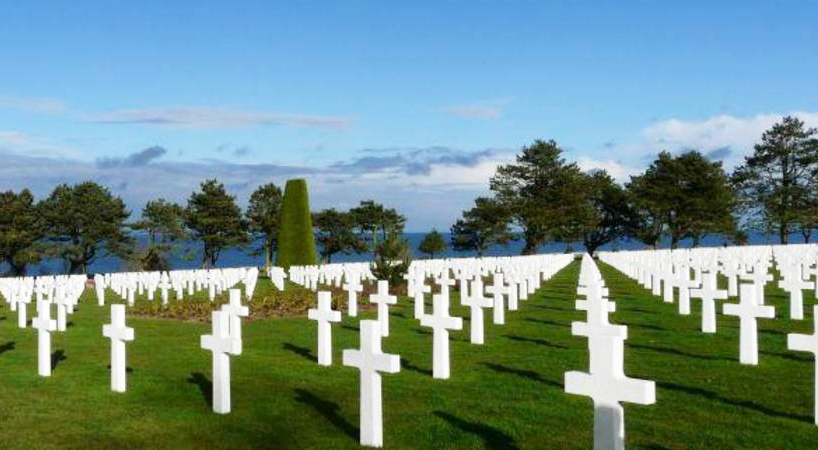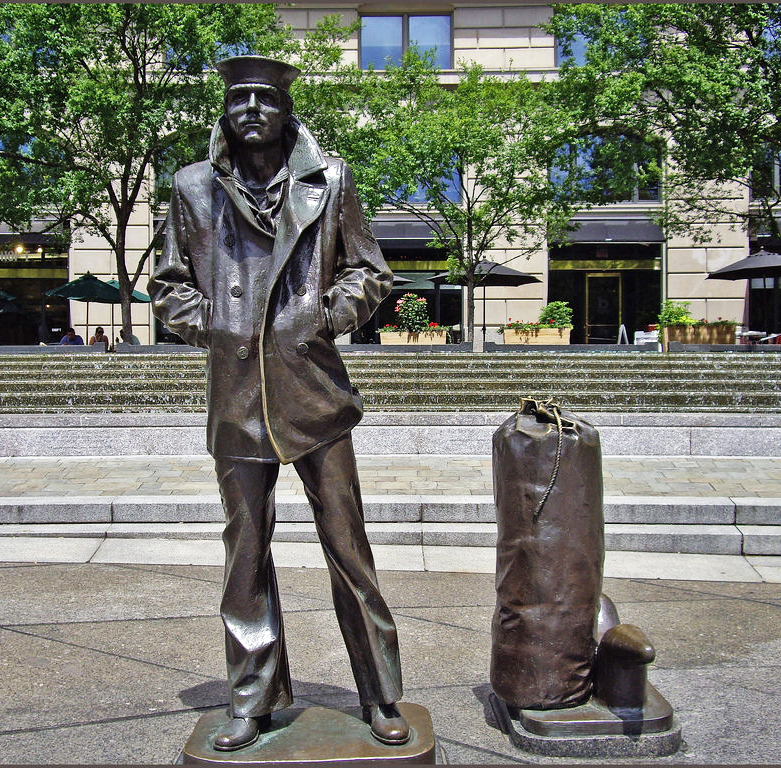By Frank DeVita
On June 6, 1944, more than 150,000 U.S., Canadian and British troops invaded Normandy to liberate France from the occupying Nazi forces. Some 130,000 arrived by boat, ferried to the beaches in light landing craft under heavy fire. The Normandy landings- code-named Operation Neptune and commonly known as D-Day, became the largest seaborne invasion in history.
Brooklyn native Frank DeVita was 19 when he participated in the D-Day invasion. For the next 70 years, he did not speak about his wartime experience, even to his wife and children. Then, in 2014, on the occasion of receiving the French Legion of Honor medal, the highest award given by the French government, he opened up in an NBC interview with Tom Brokaw conducted on Omaha Beach.
Most of the men made the trip once; Frank DeVita of the U.S. Coast Guard survived the first wave and returned to Omaha Beach 15 times. DeVita returned to Normandy in June with family and friends to mark the 75th anniversary of one of the most pivotal events in modern history. 75 years later, DeVita, of Bridgewater, NJ, tells the harrowing story of that day.
When the war broke out in 1941, I immediately tried to enlist. I was only 16 years old at the time, and my mom said I had to wait and finish high school. At 18, I joined the Coast Guard and was assigned to the USS Samuel Chase, an attack transport.
After we did the invasions of North Africa, Sicily and Salerno, we practiced two or three months for Normandy, raising and lowering the boats, day and night. The invasion was supposed to be June 5, but there was a big storm in the Channel and Eisenhower called it off till June 6. At four o’clock in the morning, we started loading our boats. We had 21 Higgins boats – LCVPs: Landing Craft Vehicle Personnel. Each one carried between 30 and 32 men.
We were 11 miles from the beach because the German 88 (mm) guns had a range of 10 miles. We started on toward the beach. It was very dangerous because of the mines and obstacles in the water called Belgian Gates. Along the beach were MG42 machine guns, each capable of firing 160 rounds per minute and 35 of these buggers were firing at us. We were all scared. It was terrible – the best word is pandemonium.
My job was to drop or raise the ramp on the front of the boat; it was made of two or three inches of reinforced steel. Machine gun bullets were bouncing off the ramp like firecrackers, so we were safe for the time being. Then the coxswain said, “DeVita, drop the ramp.” I didn’t hear him because of the roar of the guns and the two big diesel engines in the back of the boat. Then he yelled louder, “DeVita, drop the ramp!” For a few seconds I froze, because I knew when I dropped that ramp, the machine gun bullets will come into the boat. And then for the third time he yelled, punctuated with colorful profanity and I dropped the ramp. The bullets that were hitting the ramp came into the boat. About 15 or 16 GIs died immediately; many were wounded, some very seriously. Everybody thinks when you go to die, you pray to God. But when you’re about to die, the only word that comes out of your mouth is, “Mama! Mama!” That’s what they were saying.
I’m in the back of the boat, where the handle was to lower and raise the ramp, so I actually had some protection. The troops who died in front of me were absorbing the bullets that probably would have hit me. Near me were two stragglers, two young boys. One took a round in the belly, but somehow he survived that day. He was very lucky. The second kid had red hair and was maybe a foot away from me. The machine gun took his helmet and part of his head off. He was not so lucky. He was screaming, “Help me! Help me!” But I couldn’t help him. He fell at my feet, and I didn’t know what to do. I had no morphine. The only thing I had in my possession was the Lord’s Prayer. I started praying over him and when he heard the words, it seemed to calm him. Then I reached down and squeezed his hand because I wanted him to know he wasn’t alone. And then he squeezed my hand a little bit and he died. He was just a little boy. Just a little boy.
Now, the coxswain started screaming, “Lift up the ramp. Let’s get the hell out of here!” So, I pulled the handle and the ramp didn’t come up. I pulled it again. Nothing. So now we’re in serious trouble. We’re gonna be target practice for the 88s. I didn’t know what to do. The ramp was in the front and I’m in the back. I can’t see it from where I am because of the dead and wounded in front of me. I had to crawl over them to get to the ramp. And while I’m crawling, I’m crying. I’m saying to these kids, “Please excuse me. I have no other alternative.” When I got closer, I realized that two dead soldiers were on the ramp, holding it down. They never got off the boat. I tried lifting them up but I couldn’t. I weighed 125 pounds. Another guy came to help and inch by inch, we pulled them into the boat.
Meanwhile, we’re getting fired at. The bullets are like locusts, like a swarm of angry bees. You wondered when the next one’s gonna take your head off. Now, the ramp went up and the coxswain started backing out. He did a masterful job avoiding the mines and the Belgian Gates and got us out of there. We had a torturous first wave. It was 90% casualties. It was a bloodbath. We pulled alongside a hospital ship. They would only take the very badly wounded. Two guys, God bless them, jumped in our boat and started peeling the dead off to get to the live ones underneath. They retrieved seven badly wounded boys and I said, “Maybe they’ll live through the day.”
When we got to our ship, I had a big decision to make. Do I go back? And I said to myself, “Why should I send somebody in my place to be killed?” So I went back with the second wave. Altogether, I made 15 trips to the beach. They weren’t all bringing troops to the beach. Probably around the sixth or seventh wave, we started taking the dead and the wounded off the beach and back to the ship. We pulled out 308 dead bodies from the water.
By 10 o’clock at night, the white flags started coming out from the Germans, surrendering. Then our Higgins boat started going back – it looked like popcorn, all shot up and all the others went back to the Chase. I was covered with blood and vomit and didn’t want to be with anybody. So I walked to the stern of the ship. It was late. I sat down on the cold deck and I said to myself, “What the hell just happened here? Why am I still alive?”
And when my eyes got acclimated, I turned around. Against the bulkhead, piled like logs, were all these dead soldiers on top of one another. I started to cry and cried myself to sleep. The next morning, somebody shook me up and said, “Come on. We have to unload the dead.” And that’s what we did. Two people saved my life: Jesus and my mom. The reason I say my mom is that when you’re killed in action, the government sends a telegram. I was determined to live so my mom wouldn’t get that telegram. We were just kids – 17, 18, 19 years old! There were 2,000 boys that were not going see their Mamas. It was by the grace of God I was alive.
After D-Day, we took part in the invasion in southern France and the tail end of Okinawa. I was in the occupation of Japan for about four months and then my service was over. They gave me a check for $84 and a train ticket to go home. When I got back in ’47, I had only a high school diploma. My dad was a chief designer for the Navy for 30 years. He said to me, “Why don’t you follow my footsteps?” So I became a clothing designer.
I got married in ’49. Her name was Dorothy; we went to kindergarten together. We had three children – a girl and two boys. For 70 years, I never talked about the war. My wife died six years ago; she never knew. It was too horrible. I still have nightmares about that little redheaded boy. Then, my friend Fred told me, “You gotta talk about it so people know.” He opened up the lock in my brain. The 70th anniversary, five years ago, was the first time I talked about it, when I told the story to Tom Brokaw.
In June I made my 11th trip to Normandy. The beach itself doesn’t affect me that much, but there’s a cemetery right above Omaha Beach with 9,400 dead GIs. I go there every year and I cry and I cry. They made the biggest sacrifice. They gave their lives so that we have freedom today.





